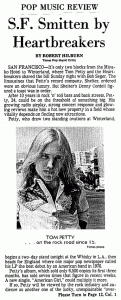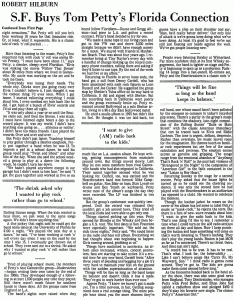Pop Music Review: S.F. Smitten by Heartbreakers
By Robert Hilburn
Los Angeles Times -- April 26, 1977
SAN FRANCISCO -- It's only two blocks from the Miyako Hotel to Winterland, where Tom Petty and the Heartbreakers shared the bill Sunday night with Bob Seger. The limousines that Petty's record company, Shelter, ordered were an obvious luxury. But Shelter's Denny Cordell figured a toast was in order.
After 10 years in rock 'n' roll bats and back streets, Petty, 24, could be on the threshold of somehting big. His growing radio airplay, strong concert response and glowing reviews make him a hot new property in a field whose vitality depends on finding new attractions.
Petty, who drew two standing ovations at Winterland, begins a two-day stand tonight at the Whisky in L.A., then heads for England where one major pop newspaper called his LP the best debut by an American band in 1976.
Petty's album, which sold only 6,500 copies in its first three months, has sold seven times that figure in recent weeks. A new single, "American Girl," could multiply it more.
If so, Petty will be viewed by the rock industry and audience as another one of the lucky, unexplainable "overnight sensations." But Petty will tell you he's been working 10 years for that limousine ride. Or at least, what it represents. His is a classic tale of rock 'n' roll pursit...
More than listening to the music, Petty's first important link with rock & roll music was seeing Elvis Presley. "I must have been about 11," says Petty, a slender, sleepy-eyed Floridian. "Elvis was making the movie 'Follow That Dream' about 30 miles from where we lived in Gainesville. My uncle was working on the set and he took me there.
"Everybdy was losing their heads. The whole city. Chicks were just going crazy over Elvis. I couldn't believe it. I just thought it was the coolest thing I'd ever seen. When I got home, I started collecting everything I could about him. I even combed my hair back like he did. I got hold of a bunch of Elvis' records and I'd sit and play them all night.
"It was only a year or so until the Beatles came out. And then the Stones. I was stuck. I must have listened eight hours a day to the record player. It was my world. i didn't have anything else going on... Athletics or nothin'. I didn't have too many friends. I just played the records. Over and over and over..."
But Petty didn't just listen. Teaching himself to play guitar through a Beatles songbook, Petty put together a band when he was 13. To impress a girl at a school dance, he said his group could play "Twist and Shout" and other hits of the day. When she said the school needed a group to play at a dance the following week, he couldn't turn her down.
"We hadn't played anywhere expect in our garage but I didn't want to lose face," he said. "I got the guys together and worked at five or six Rolling Stones songs. When the kids wanted to hear more, we just went to the same songs again. We didn't know anything else."
A disc jockey that night said he could get the band some dates at the University of Florida for $100 a night. "We played the next day at a dance," he said. "I've been working at rock 'n' roll every day since. I was on the road by the time I was 15. I eventually got thrown out of school. They even sent me to a shrink. He asked why I wanted to play rock 'n' roll rather than go to school."
Tired of playing others' music, the members of Petty's best Gainesville group -- Mudcrutches -- began writing their own tunes by the end of thw 1960s. They developed enough of a following to attract 1,000 people any time they played. Still, there wasn't mich future for Southern bands in those days. All the groups came from England or L.A.
The band's sights were raised when they heard fellow Floridians -- Duane and Gregg Allman -- had gone to L.A. and gotten a record contract. Petty's band decided to try for one.
"We made a demo tape in our living room and got in this VW van and drive 3,000 miles straight because we didn't have enough money for a motel. We stayed with friends in Manhattan Beach. That was about four years ago. I remember being at Tiny Naylor's every day with a handful of change looking up the record company phone numbers, calling them and asking if they'd listen to our tape. By the end of the week we had five or six offers."
Returning to Florida to sever loose ends, the band got a call from Denny Cordell, who has been associated with such rock figures as Leon Russell and Joe Cocker. He suggested the group stop by Shelter's Tulsa office on its way back to California. It did and signed with Shelter. But the recording back in California went poorly and the group eventually broke up. Petty remained around Hollywood as a solo Shelter artist, living in a $6 a day East Hollywood motel.
He tried a studio album in 1975 but didn't like its feel. He thought it was too laid-back, too much like an L.A. session album. He kept writing, getting encouragement from musicians around town. But things moved slowly. Last May he met some members from rival Gainesville bands who had also migrated to California. Their sound together seemed what he was looking for. Cordell, too, was excited and the Heartbreakers band was formed: Mike Campbell on guitar, Ron Blair on bass, Stan Lynch on drums, and Ben Tench on keyboards. Petty wrote most of the album's songs the day they were recorded. The LP was finished in two weeks.
But the group's excitement was quickly tempered. Until the record was released they couldn't get a job around town. They tried all the local clubs and were able to get only one.
Things started picking up this year. Petty opened for Blondie at the Whisky and then began a U.S. tour. The first dates in San Francisco were especially important. "We sold out the club three nights," Petty said. "We could listen to the radio and hear our album. Everything we had thought about was beginning to happen. Girls coming around, grabbing at us."
Things have continued to accelerate. As album sales increased, writers, concert promoters, fans are starting to take notice. It's a crucial tiume for any band, Cordell feels: "After three years of pleading and begging for a job it's very hard to maintain your feet on the ground with the sudden supersaturation of attention. Things will be fine as long as the band keeps its balance and doesn't think it has it made. They've got to work harder than ever now."
Agrees Petty, "I know we haven't got it made yet. I'm a little nervous, in fact. Getting recognized does a real strange thing. The more people hear about you the more chances they're gonna have a chip on their shoulder and say, 'Man, he'd really better deliver.' Our only line of attack is we're gonna keep doing what we've been doing. At least it's good to deel we're not still just beating our heads against the wall. We've got people listening now."
People were listening Sunday at Winterland. Far more confident than at its first Whisky engagement, the band is tight on stage and Petty is beginning to open up as a performer. Packing 14 songs into a fast-paced, 65-minute set, Petty and the Heartbreakers is a classic rock 'n' roll band, one whose sound hasn't been polluted by the excesses so common in today's recycled pop scene. There's a purity in the group's music that combines the shadowy, like-night compulsion of the Rolling Stones' "Exile on Main Street" with the classic American immediacy that can be traced back to Elvis and Eddie Cochran. The tone is urgent, defiant, desperate. Rather than overstate, his music leaves room for the imagination. His themes touch on familiar rock experiences but are free of the usual calculation and pretense. The emotion comes across as genuine and gripping. The songs range form the emotional abandon of "Anything That's Rock 'n' Roll" to the pool hall violence of "Strangered in the Night" to the compassion of "American Girk" to the faith contained in the new "Listen to Her Heart."
Returning Sunday to the stage for a second encore, Petty asked that the house lights be turned up so he could see the cheering audience. It was only the second time he had played with the Heartbreakers in an auditorium (as opposed to a club). He wanted to celebrate the moment.
Though the leather jacket he wears on the cover of his album has led some to lavel Petty's music as "punk-rock," he rejects the term. But there is a hint of new-wave crusade about him: "I want to give the radio back to the kids. That's one thing I'd like to see. I remember a time when I could turn on the AM radio and just sit there all day and listen. Now I keep punching the button and hope something will come on that's worth listening to. There's nothing. They don't play the young bands. Boston is just MOR as far as I'm concerned. There's no threat there. And disco just ain't right.
"A record has to be true. It has to be real. That's what I look for, the believability... Like I can't believe songs like 'Carry On, My Wayward, Son.' I think radio is gonna come around. They've got to. The kids are gonna make them come around before long."
As the limousine headed back to the hotel after the show, there was also some good news from England. Tony Dimitriades, who manages Petty with Fred Heller, said Elton John had called a radiothon show and pledged $450 if they've play his favorite new single. The choice: Petty's "American Girl."

